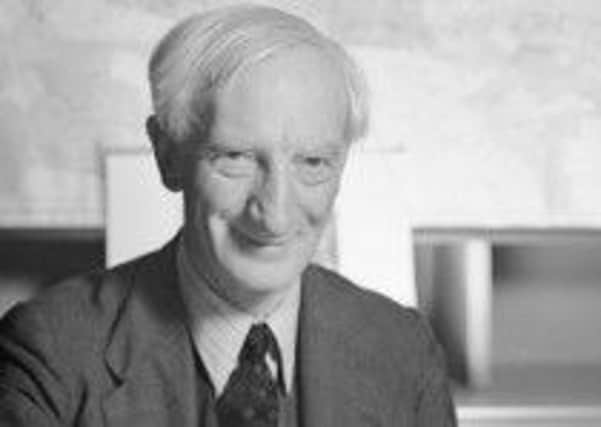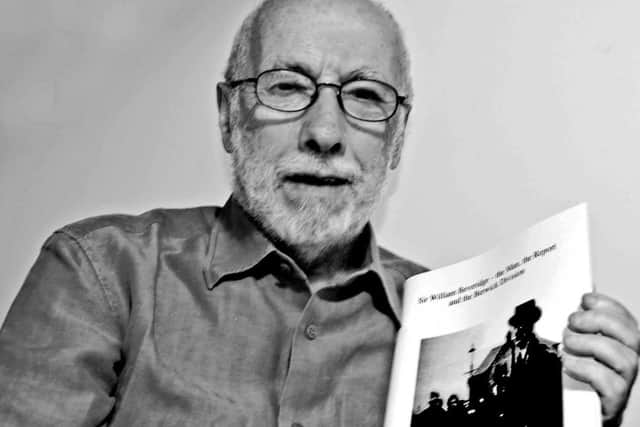How Berwick turned its back on great social reformer Beveridge


Mike, a twinkly-eyed Scot from Inverness, with a self-deprecating chuckle, retired to Belford some 10 years ago with “extremely patient” wife, Margaret. He’s spent the intervening years being a self-styled “Scottish layabout in Northumberland”. Mike’s version of slobbishness includes two book groups, a philosophy club, the Ramblers, and eye-watering numbers of Twitterers following his tweets on national and local news. These pastimes have been interspersed with what Margaret calls ‘Things’. One ‘Thing’ was an MPhil in Social Policy. Another is the reason we are discussing Lord William Beveridge, architect of the Welfare State.
Mike responded to a lottery-funded project inviting people to identify national and local political stories. “After Beveridge’s 1942 report on social reform he was almost a superstar. People chased him for his autograph. In 1945 he was elected Berwick’s MP. But he was ousted after just 10 months. I was intrigued.”
Advertisement
Hide AdAdvertisement
Hide AdMike passes me his 104-page monograph. A grainy photo of a trilby-hatted Sir William Beveridge in Berwick with some grumpy-looking women in the background adorns the front cover. The result of two years’ research, the document will reside in the House of Commons. Mike says, “I’ve been incredibly lucky.” A lot of Mike’s luck is self-authored. He’s pursued Beveridge like a ferret after a rabbit. He’s read, tweeted, written, interviewed, chatted, travelled.


Of Berwick Record Office’s Linda Bankier, Mike says, “She’s a total star. Berwick is so lucky to have her.” Sir Alan Beith, current MP for Berwick, contributed too. As the longest standing Liberal Democrat MP since Lloyd George, Beith is a fitting counterpoint to Beveridge’s short-lived tenancy. At the London School of Economics (Beveridge was Director, 1919 to 1937), Mike photocopied some 600 documents.
He’s pieced together the story of a man whose public ambitions were largely frustrated but who achieved personal contentment – eventually. Beveridge’s long-standing professional relationship with his second cousin David Mair’s wife began at the start of the First World War. Nearly 30 years later they married when, on the evening of Mair’s funeral, according to Mair’s son, Beveridge “showed momentary surprise when one of my sisters suggested that our mother’s best future lay in his hands” and then “instantly” agreed. The marriage was successful. Even when separated during a stint in a nursing home in 1956, the pair sent letters to one another which staff ferried along the corridors. “I didn’t expect to walk in Beveridge’s footsteps,” says Mike.” But people shared anecdotes and led me to places he’d lived. For example, Jane Hall’s aunt drove Beveridge during his election campaign. Apparently he walked the fields talking to farm labourers through a megaphone. This, and his rather squeaky voice, caused some amusement. Jane put me in touch with Naomi Barrett, owner of Tuggal Hall where the Beveridges lived from 1945-1951. I found myself sitting in the kitchen where he drank tea after his disastrous election defeat in 1946.”
Beveridge’s life-long passion for social reform did not translate into an empathetic public persona. A story from one election meeting is salutary. A woman, so offended by Beveridge’s rudeness, changed her vote from Liberal to Labour. And so, the man whose report shaped the Welfare State, and who worked tirelessly in Northumberland even after his defeat, is barely acknowledged here.
Advertisement
Hide AdAdvertisement
Hide AdMike says: “He seems to have been warmer on a personal level – Jean Mann’s father did some building work for Beveridge and mentioned some difficulty over a trip to Australia. Beveridge arranged a sea passage for Jean’s parents – he and his wife even went to wave them off at Chathill Station.”
The final connection was an email address found in a book from Tuggal Hall. It led Mike to David and Eileen Burn at Carrycoats Hall near Hexham in April this year. “It was a privilege to meet Lady Beveridge’s grandson. And to be invited to the Memorial Service at Thockrington Church for Lord Beveridge led by John Sentamu.”
Mike was also asked to prepare the biographical notes handed to the congregation. The family said he knew more about their much loved step-grandfather than they did.